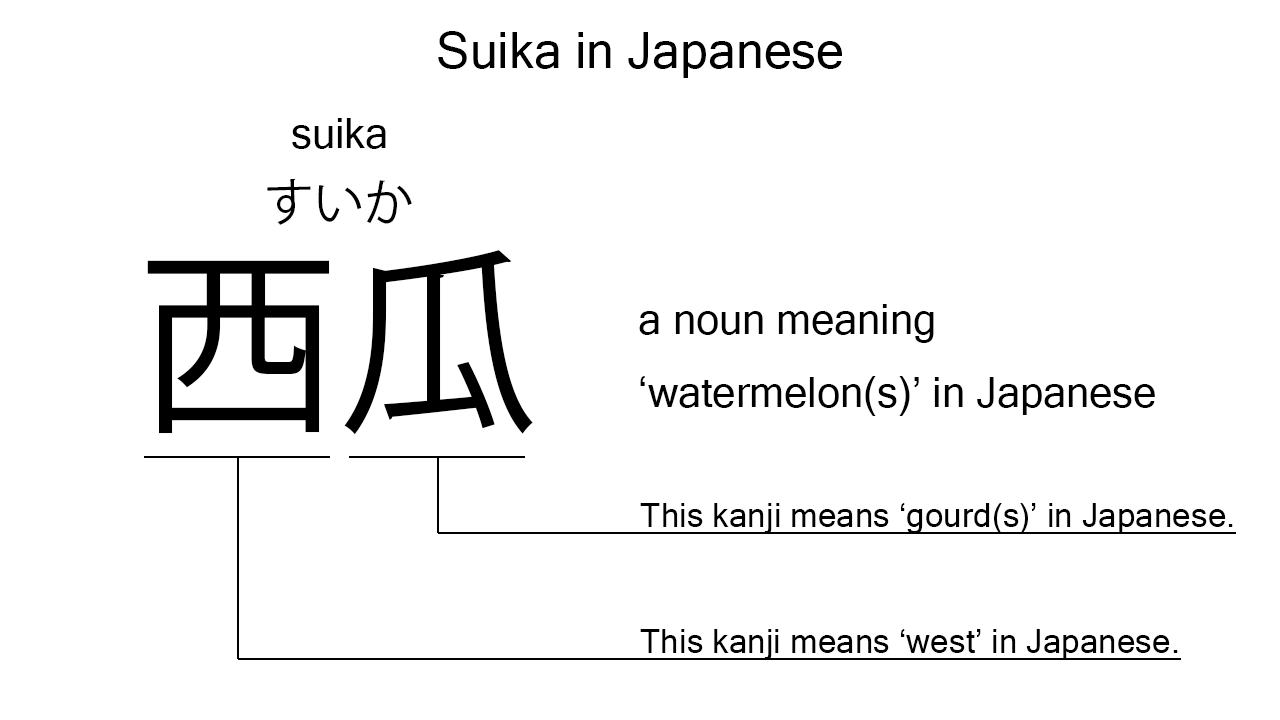What does “suika” mean in Japanese?
Native speakers say “suika” to mean ‘watermelon’ in Japanese. Perhaps, some Japanese learners know this word as it is sometimes used in Japanese movies, novels, manga, anime, and the like. In this blog post, however, I will explain this word in detail based on its kanji expression. And also, I will explain how to use it through the example sentences. My explanations would help Japanese learners understand “suika” more clearly. Then, let’s get started!
Contents
Definition and meaning of “suika”
Let me start with the definition and meaning of “suika”.
- suika – 西瓜 (すいか) : a noun meaning ‘watermelon’ in Japanese. This can also work as plural. Learn more about Japanese plural.
The definition and meaning are simple and clear. To understand this noun more clearly, however, let me explain its kanji characters in detail, one by one.
What does “suika” literally mean in Japanese?
The kanji expression of “suika” consists of the following two kanji characters:
- 西 : a kanji character used to mean ‘west’ in Japanese.
- 瓜 : a kanji character used to mean ‘gourd’ in Japanese.
These two kanji characters tell us that “suika” literally means ‘west gourds’ in Japanese. This literal interpretation is not in line with the actual meaning, but represents well the origin of the fruit. Apparently, the fruit called watermelon was imported from China which is to the west of Japan. And besides, it originally came from the Central Asia to China. These stories are completely in line with the kanji expression.

When we meet new kanji expressions, we should check their kanji characters in detail to understand their meanings clearly and deeply. In many cases, kanji characters tell us a lot about the meanings of the expressions they form. Actually, here, we could get the better understanding of “suika” through the detailed kanji check above.
So far, I’ve explained the definition and meaning of “suika” together with its kanji characters. Then, let me explain how to use it through the example sentences below.
Example #1: how to say “watermelon” in Japanese
boku no sukina kudamono wa suika desu – 僕の好きな果物は西瓜です (ぼくのすきなくだものはすいかです)
My favorite fruit is watermelon.
Below are the new words used in the example sentence.
- boku – 僕 (ぼく) : a pronoun meaning ‘I’ in Japanese. This is used mainly by boys and young males.
- no – の : a case particle used after a noun or pronoun to make its possessive case. In the example, this is used after “boku” to make its possessive case, “boku no”, which means ‘my’ in Japanese.
- sukina – 好きな (すきな) : a na-adjective meaning ‘favorite’ in Japanese.
- kudamono – 果物 (くだもの) : a noun meaning ‘fruit’ in Japanese.
- wa – は : a binding particle working as a case marker or topic marker. In the example, this works after “boku no sukina kudamono” to make the subject in the sentence.
- desu – です : an auxiliary verb used after a noun or adjective to make it polite. Probably, this is well known as a part of Japanese desu form. In the example, this is used after “suika” to make it sound polite.
This is a typical usage of “suika”. In the example, it works as the object in the sentence and means ‘watermelon’ in Japanese.
Example #2: another usage of “suika”
watashi no musume mo suika ga suki desu – 私の娘も西瓜が好きです (わたしのむすめもすいかがすきです)
My daughter loves watermelons, too.
Below are the new words used in the example sentence.
- watashi – 私 (わたし) : a pronoun meaning ‘I’ in Japanese. In the example, this works together with the case particle, “no”, to mean ‘my’ in Japanese.
- musume – 娘 (むすめ) : a noun meaning ‘daughter’ in Japanese. This can also work as plural.
- mo – も : a binding particle making the subject word or the object word in a sentence with adding the meaning of ‘too’, ‘also’, or ‘as well’. In the example, this works after “watashi no musume” to make the subject in the sentence with adding the meaning of ‘too’.
- ga – が : a case particle used to make the subject word or the object word in a sentence. In the example, this is used after “suika” to make the object in the sentence.
- suki – 好き (すき) : the stem part of the na-adjective, “sukina”, which means ‘favorite’ in Japanese. Native speakers, however, often use this as an individual word to mean ‘to like’ or ‘to love’ in Japanese. In the example, this is used to mean ‘to love’.
This is another typical usage of “suika”. When we want to say “watermelons” in Japanese, this noun is always a very good option.
Summary
In this blog post, I’ve explained the definition and meaning of “suika” in detail based on its kanji expression. And also, I’ve explained how to use it through the example sentences. Let me summarize them as follows.
- suika – 西瓜 (すいか) : a noun meaning ‘watermelon’ in Japanese. These two kanji characters literally mean ‘west gourds’ in Japanese. This literal interpretation is not in line with the actual meaning, but represents well the origin of the fruit. Apparently, the fruit called watermelon was imported from China which is to the west of Japan. And besides, it originally came from the Central Asia to China. These stories are completely in line with the kanji expression.
Hope my explanations are understandable and helpful for Japanese learners.